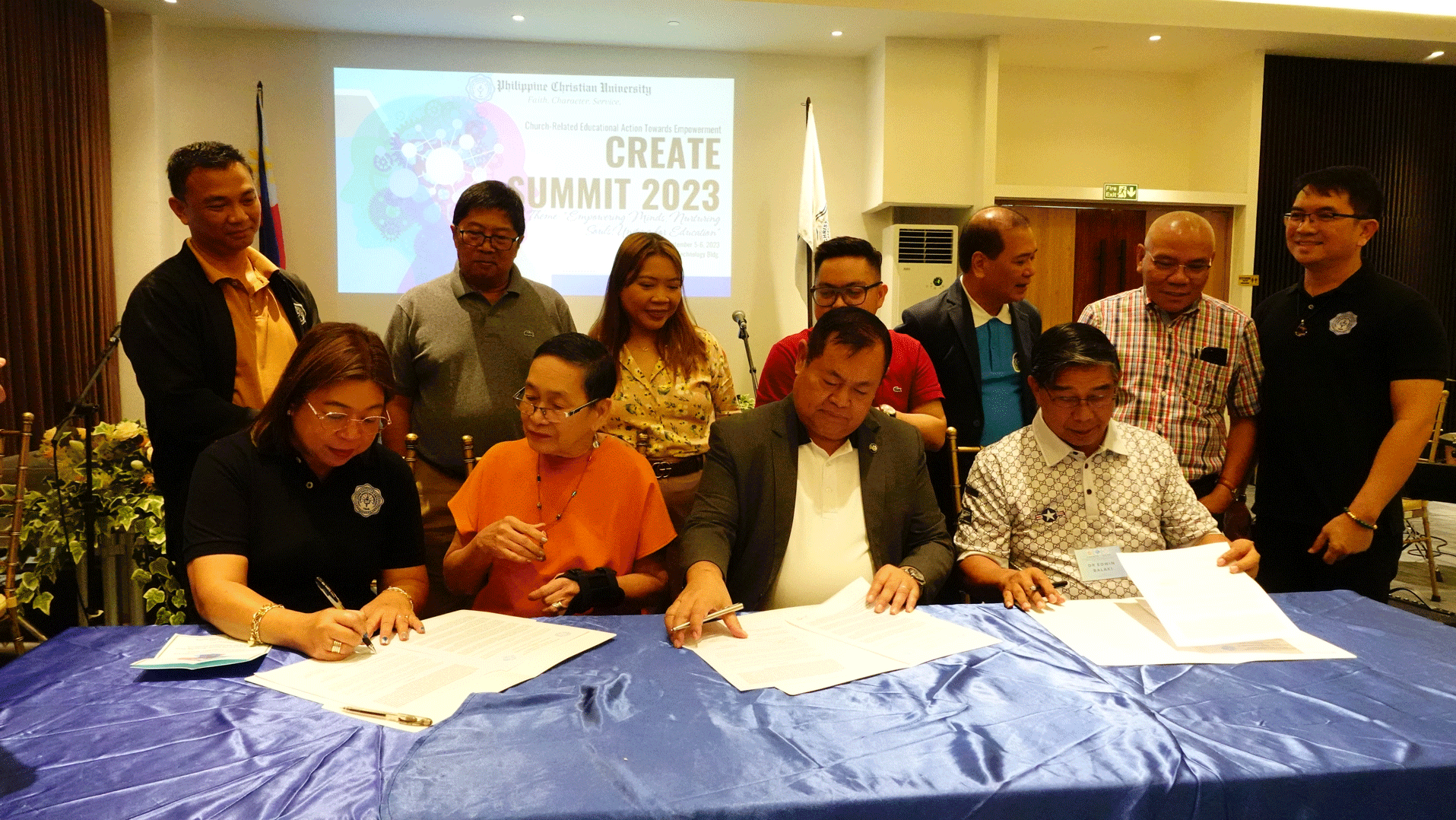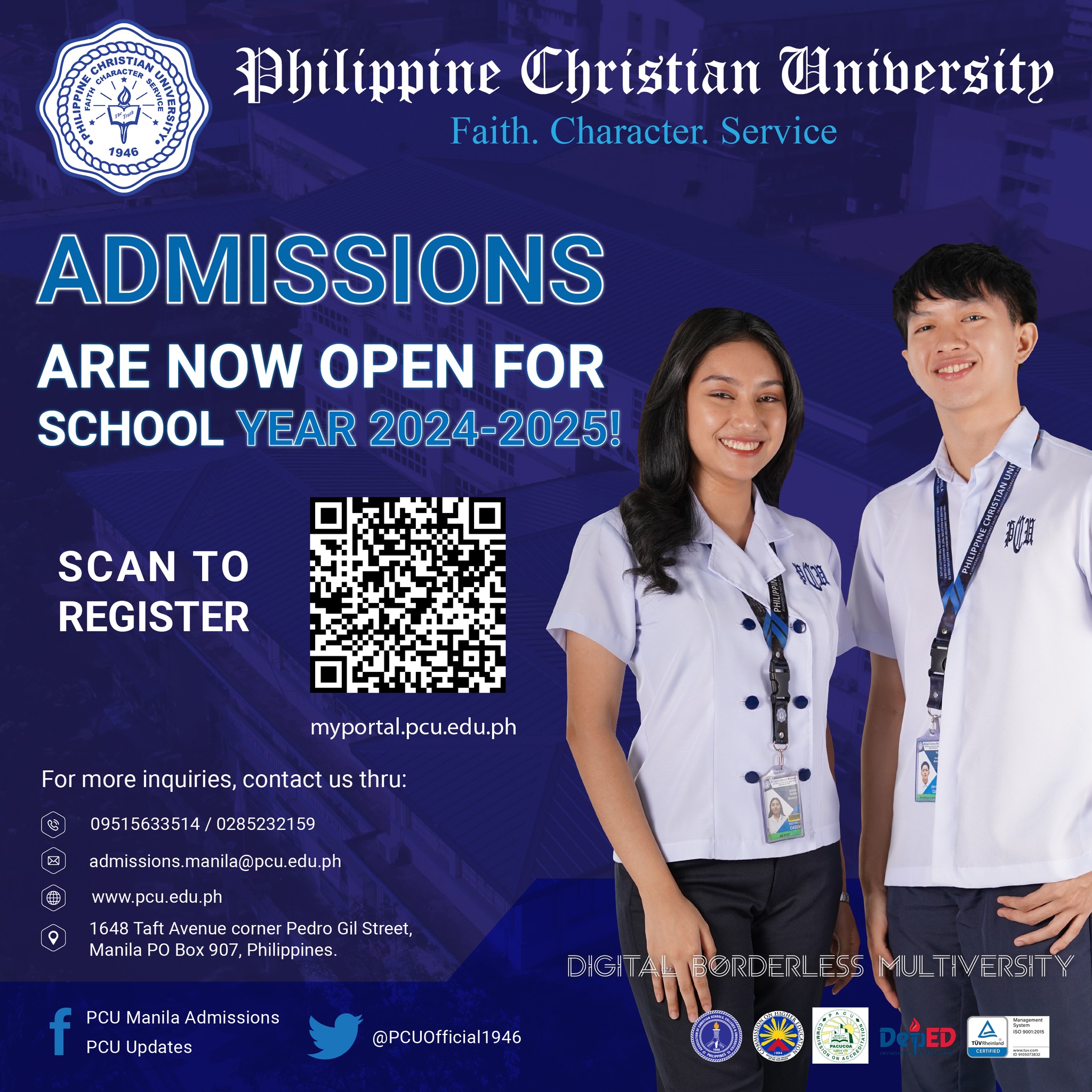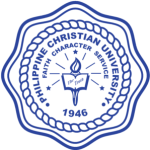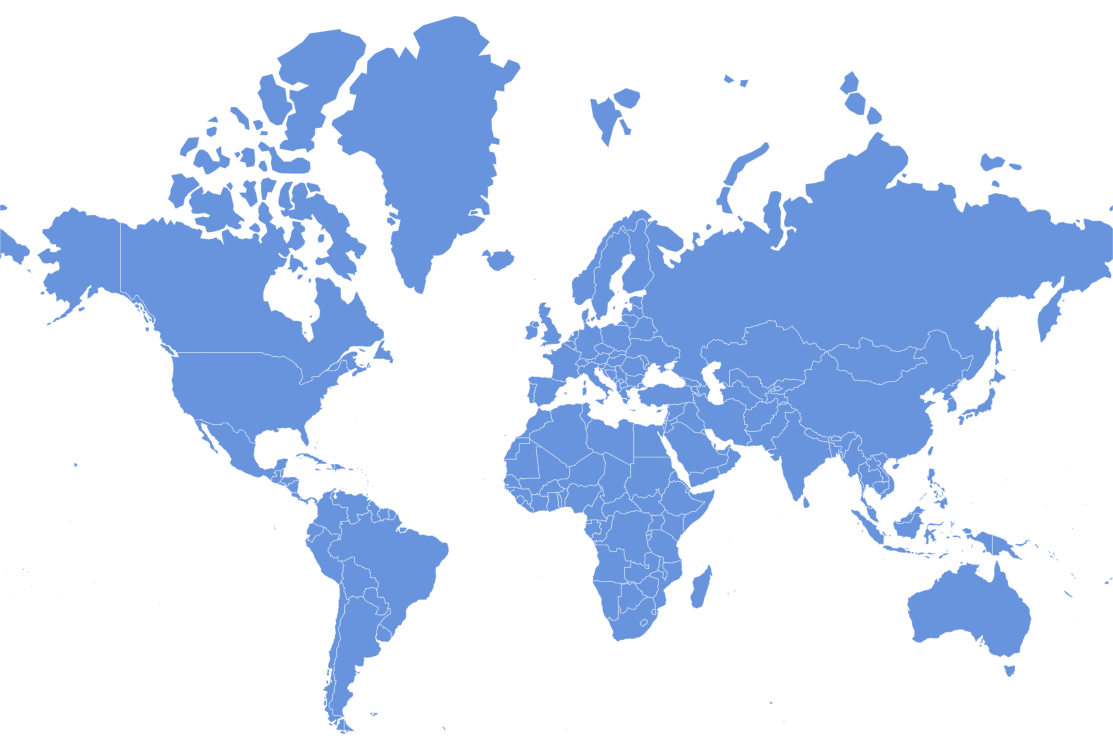Philippine Christian University History
In 1945, Bishop Edwin F. Lee of the United Methodist Church (UMC) established a Christian School in Manila. On October 6, 1946, the laymen of the Evangelical Association of the Philippines founded a college. The members of the of the newly-created school were Atty. Juan Nabong Sr., Dr. Mateo Occenia, Dr. Emilio Javier, Dr. Mauro Baradi and Mr. Gerardo Armonio.
On January 11, 1947, the Articles of Incorporation was registered with the Securities and Exchange Commission. The original name of the institution was Manila Union College, but this was later changed to Philippine Christian Colleges. In 1967, the Articles of Incorporation was again amended to remove the letter “s” after “Colleges”. A transition to full corporate governance was established when Dr. Roxy Lefforge, (1948-1952), an American Missionary, was appointed as the school’s first Executive Dean.
Dr. Emilio Javier (1952-1958), layman of the UCCP, was elected as its first President. Under his leadership, the institution expanded its ecumenical efforts in education. The Union High School of Manila and the Union Elementary School were founded by the Presbyterian Church in 1919 and 1946 respectively, and became part of Philippine Christian College in 1948. In 1953, the Mary Johnston School of Nursing, founded by the Methodist in 1907, affiliated with PCC, thereby starting the offering of a Nursing degree.
Dr. Juan Nabong Sr., (1958-1969), a Methodist layman, was the second President of Philippine Christian College. During his term, a four-story concrete building was constructed in 1960 beside the UTS building on Taft Avenue. A year later, another two-story building to house the elementary school was constructed on Vasquez St., Malate. The Ellinwood College of Christian Education merged with Philippine Christian College in 1968 and its curricular were integrated with the programs of the College of Education.
Dr. Lino Q. Arquiza (1969-1988), a UCCP educator, was the third President of Philippine Christian College. In 1976, PCC acquired its University status and became Philippine Christian University. In 1978, as a result of the cooperative efforts between Philippine Christian University (PCU) and the Union Theological Seminary (UTS), a merger was forged to highlight a significant development in the history of the University. Thus, the Philippine Christian Center for Learning (PCCL) was founded. With this partnership, PCU expanded its offerings in the 97-hectare UTS campus in Dasmarinas, Cavite, 36 kilometers south of Manila. This alliance between PCU and UTS fostered an ecumenical relationship marked by cooperative influence and development. The efforts of this concerted teamwork were manifested in the consortium undertaking of non-protestant schools with Philippine Christian University. In 1972, PCU and De La Salle engaged in a resource-sharing program. Later, in 1975, an Inter-Institutional Consortium (I-IC) was formed to include De La Salle University, St. Paul College Manila, St. Scholastic’s College, Philippine Normal University and Philippine Christian University. The Inter- Institutional Consortium (I-IC) enjoyed the full support of the United Board of Christian Higher Education in Asia.
With the demise of Dr. Lino Q. Arquiza, PCU had a succession of two capable church members who served as officers-in-charge of the university. They were Justice Crisolito Pascual (1988) and Dr. Betty I. Molina (1989).
In 1990, the Board of Trustees elected Dr. Carlito S. Puno (1990-2000), a Methodist layman, as the fourth President. Dr. Puno provided a new vision and creative leadership. PCU became an active participant in the globalization of education. Under his leadership, the University pursued an effective expansion through off-campus projects and overseas institutional articulations.
The year 2000 resulted in significant changes for the University. Dr. Oscar S. Suarez, a Princeton- educated UCCP pastor, was elected fifth President. His term was marked with concerns in vision formation, planning and implementation policies. He organized a number of programs in the areas of curriculum, organization and faculty and student development. As a result of these valuable inputs in education management, a more responsive PCU Vision-Mission Statement was delineated: the CHED’s grant of PCU Autonomy Status realized; and the CHED-preferred vertical articulation of the graduate programs implemented.
Pursuant to the Interim Rules of Procedure Governing Intra-Corporate Controversies, the Philippine Christian University was place under Receivership on September 23, 2008 that would last until a Management Committee was duly constituted. After three months, the Regional Trial Court “Order” NCJR, Branch 24, Manila dated November 21, 2008 created and appointed a three-member Management Committee namely: Atty. Felix D. Carao, Jr., Chairman, Justice Wenceslao 1. Agnir, Jr. (Ret) and Dr. Quintin S. Doromal (deceased), as members respectively. The Management Committee has assumed the responsibility of the PCU Office of the President and the Board of Trustees, specifically to preserve the University’s assets and properties.
A status quo of excellence in the academic management of the PCU exists in spite of its intra- controversy. The only imperative thing to do is to restore corporate governance and work for the settlement of all issues related to the PCU Corporate Structure.
In November, 2013, the Management Committee set the proper timeframe for transition from court administration of PCU affairs to full normalization when it had succeeded to convince the court to terminate the pending case of Nakpil, et. al vs. Suarez, et al paving the way for the reconstitution of the PCU Board of Trustees and the election of Atty. Felix D. Carao, Jr. as the sixth President for a term of one (1) year and his subsequent investiture on December 16, 2013 at the United Methodist Central Church. However, the governance of PCU was again put to test due Atty. Carao’s death on April 17, 2014. This prompted the BOT’s decision to designate Vice Chairman and Corporate Secretary Judge Edwin G. Larida, Jr. as Officer-in-Charge, Office of the President.
In June 2014, the PCU Board of Trustees elected Junifen F. Gauuan, Ph. D. a Methodist Layman, scholar in development management and administration, and former President of Aldersgate College, as the seventh President of Philippine Christian University, culminating in the Investiture Ceremony held on June 05, 2014 at the Central United Methodist Church, Kalaw St., Manila. This was a very timely corporate decision by the reconstituted PCU Board of Trustees headed by Atty. Perfecto R. Yasay, Jr., Chairman, ending the University’s struggle with the effects of the Intra-Corporate Controversy.
Several significant breakthroughs capped the state of excellence in the academic management of the Philippine Christian University. The following achievements highlighted the institution’s unwavering pursuit in sustaining quality education towards academic excellence:
- Fully implemented the K-12 Program that started during the SY 2016-2017.
- Re-affirmation of Level IV accreditation status of the College of Arts, Sciences and Social Work (CASSW) by ACSCU-AAI effective April 2018 to April 2023.
- Obtained Level IV accreditation status of the College of Education and Allied Programs’ (CEDAP) Bachelor of Science in Education (BSEd) and Bachelor of Elementary Education (BEEd) programs from the ACSCU-AAI on June 28, 2018, to May 2021.
- Obtained Level IV status of the Graduate School of Business – Master in Management and Master in Business Administration programs from ACSCU-AAI from June 28, 2018, to May 2021.
- Awarded ISO 9001:2015 Certification by a renowned ISO accredited audit organization, the TUV Rheinland GmbH, with validity from 2018-06-06 to 2023-04-02.
- Deputized by CHED to be a Delivering Higher Education Institution (DHEI) of nine (9) of its graduate programs namely: MS in Social Work w/ Specialization in Administration and Policy Development; MS Social Work w/ Specialization in Social Work Education; MAEd w/ Specialization in Guidance and Counselling; MAEd w/ Specialization in English; MAEd w/ Specialization in Early Childhood; MAEd w/ Specialization in Educational Administration; MAEd w/ Specialization in Teacher Training for Teaching Practical or Vocational Studies; MAEd w/ Specialization in Filipino; and MA in Nursing w/ Specialization in Leadership Management. The effectiveness of being a DHEI commenced from April 1, 2016, unless otherwise revoked by the commission.
- Granted Deregulated Status by CHED effective April 1, 2016, to May 31, 2019.
- Elevated to Full Autonomous Status, as an HEI, by the Commission on Higher Education (CHED) ON May 18, 2017. This status holds validity from May 9, 2017, to May 31, 2023.
- Pioneered the spearheading of the 1st ACSCU- sponsored NCR/SL Research Congress on “Landscaping Global Competency: Education in the 21st Century held at Trinity University of Asia on December 1, 2017. This was followed by succeeding Research Congresses in the same venue in 2018 and 2019 under the leading role of Philippine Christian University.
- Breakthrough in the area of research:
- Recipient of research granted by the Private Education Assistance Committee (PEAC) on School Resources Utilization and their Impact on Quality Education (January 17 to December 2019;
- Actively participated, through a number of its college faculty researchers as presenters, in national and international research congresses either held here on abroad;
- Currently undertaking a research study in partnership with Kao Yuan University and Chung Chou University, both of which are in Taiwan; and
- Signed a Memorandum of Agreement with the Adventist University of Asia to establish an academic and research cooperation program.
- Established Transnational Education Program (TNE) partnership with the following: 10.6 Global Mission Cambodia Center in Battambang City, Battambang Province, Cambodia;
- Al-Andalus International School in Al Khobar North, Kingdom of Saudi Arabia; and, 10.8 Bellarmine Global Education Co., Ltd. In Mueang, Nontthaburi, Bangkok, Thailand.
- Faculty members and Graduate School students are actively presenting and publishing their papers in international forums, conferences and online publications.
- Recipient of research granted by the Private Education Assistance Committee (PEAC) on School Resources Utilization and their Impact on Quality Education (January 17 to December 2019;
- Signed memorandums of agreement for faculty and student exchange programs and other academic activities with the following Foreign Higher Educational Institutions (FHEIs);
- Rajamangala University of Technology Thanyaburi (RMUTT), Thailand
- Chung Chou University of Science and Technology, Taiwan
- Kao Yuan University, Taiwan.
- Korea Institute of Technology, Seoul, South Korea.
- Widyatama University, Bandung, Indonesia
- Adventist Universitat Indonesia, Bandung, Indonesia
- Rajamangala University of Technology Thanyaburi (RMUTT), Thailand
PCU, through the years, has significantly grown into an institution that is responsive to national needs. Under the aegis of its church benefactors, the United Methodist Church and the United Church of Christ in the Philippines, PCU continues to toe the mark distinctively expressed in its Vision and Mission Statements. Indeed, despite internal and external challenges that may come its way, the University is committed to remaining a distinctively strong Christian University, as envisioned by its founders.
God Bless Philippine Christian University.







